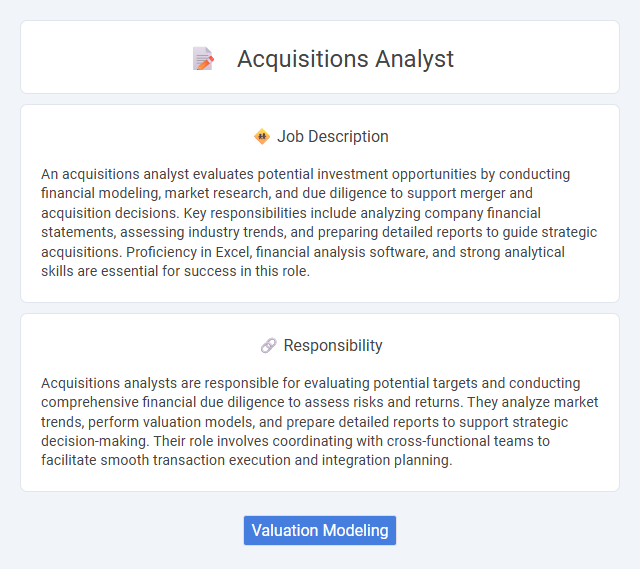
An acquisitions analyst evaluates potential investment opportunities by conducting financial modeling, market research, and due diligence to support merger and acquisition decisions. Key responsibilities include analyzing company financial statements, assessing industry trends, and preparing detailed reports to guide strategic acquisitions. Proficiency in Excel, financial analysis software, and strong analytical skills are essential for success in this role.
Individuals with strong analytical skills and attention to detail are likely to thrive as acquisitions analysts, as the role demands thorough evaluation of financial data and market trends. Those comfortable working under pressure and adept at multitasking may find this position suitable, given the fast-paced environment and tight deadlines often involved. Candidates lacking proficiency in data interpretation or struggling with high-stress scenarios might face challenges in meeting the job requirements effectively.
Qualification
Acquisitions analysts require strong analytical skills, proficiency in financial modeling, and expertise in market research to evaluate potential investment opportunities. A bachelor's degree in finance, economics, or business administration is typically essential, while advanced certifications such as CFA or CPA enhance credibility. Experience with data analysis tools like Excel, SQL, and financial software is crucial for accurate valuation and due diligence processes.
Responsibility
Acquisitions analysts are responsible for evaluating potential targets and conducting comprehensive financial due diligence to assess risks and returns. They analyze market trends, perform valuation models, and prepare detailed reports to support strategic decision-making. Their role involves coordinating with cross-functional teams to facilitate smooth transaction execution and integration planning.
Benefit
An acquisitions analyst position likely offers significant financial benefits, including competitive salaries and performance-based bonuses. The role may provide opportunities for professional growth and skill development in financial modeling and market analysis. There is a strong probability that analysts gain valuable industry insights leading to long-term career advancement.
Challenge
Acquisitions analysts likely face complex challenges in evaluating multifaceted financial data to identify viable investment opportunities. The role probably demands acute attention to detail and strong analytical skills to navigate market volatility and regulatory changes effectively. Success in this position may depend on the ability to rapidly adapt to shifting acquisition criteria and collaborate closely with cross-functional teams.
Career Advancement
An Acquisitions Analyst plays a critical role in identifying and evaluating potential investment opportunities, utilizing data-driven market analysis and financial modeling to support strategic decision-making. Expertise gained in due diligence, deal structuring, and negotiation paves the way for progression into roles such as Senior Analyst, Investment Manager, or Director of Acquisitions within real estate, private equity, or corporate development sectors. Continuous skill enhancement in financial analysis, market research, and stakeholder communication is essential for leveraging career advancement in acquisitions.
Key Terms
Valuation Modeling
Acquisitions analysts specialize in valuation modeling to assess potential investment opportunities, utilizing discounted cash flow (DCF) analysis, comparable company analysis, and precedent transactions to determine asset worth. Their expertise in financial modeling software like Excel and advanced valuation techniques ensures accurate projections of future cash flows and risk-adjusted returns. This role is critical in guiding strategic acquisition decisions within private equity, real estate, and corporate mergers and acquisitions.
 kuljobs.com
kuljobs.com